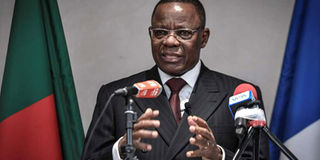What's at stake in Cameroon's parliamentary elections

Maurice Kamto, Cameroonian opposition leader of Movement for the Rebirth of Cameroon (MRC) and former presidential candidate, gives a press conference on January 30, 2020 in Paris. PHOTO | STEPHANE DE SAKUTIN | AFP
What you need to know:
- Maurice Kamto, who mounted the strongest challenge to President Paul Biya's rule in 2018, has kept his party out of the vote because of the violence.
- More than four dozen parties are taking part in the two elections, which should have taken place in 2017 but were twice postponed.
- Jailed for nine months after his supporters demonstrated against the official outcome of the presidential poll, Biya's strongest challenger Maurice Kamto says a fair election is impossible given the country's problems.
Yaounde,
Cameroon's first parliamentary and municipal elections in seven years are due on February 9, despite jihadist attacks in the north and a bloody separatist struggle in the west.
Maurice Kamto, who mounted the strongest challenge to President Paul Biya's rule in 2018, has kept his party out of the vote because of the violence.
Once again, the Cameroon People's Democratic Movement (RDPC) formed by 86-year-old Biya looks well placed to sweep the polls.
Here is a snapshot:
More than four dozen parties are taking part in the two elections, which should have taken place in 2017 but were twice postponed.
The behemoth is the RDPC, which has a majority of 148 in the current 180-seat legislature. In many constituencies, its candidate is not even being challenged.
The leadership of the Social Democratic Front (SDF), historically the main party of English-speaking regions and the main opposition party in parliament with 18 lawmakers, finally decided to contest after threatening a boycott.
"In the last elections, the SDF lost ground. It needs to regain the lost seats," said Stephane Akoa, a researcher at the Paul Ango Ela Foundation for geopolitics in Yaounde.
A third contestant to watch is the Cameroon Party for National Reconciliation (PCRN) headed by journalist Cabral Libii, 39, which hopes to knock the SDF into third place and become the main parliamentary opposition to Biya's forces.
Kamto, winner of second place in the 2018 presidential poll, pulled his Movement for the Rebirth of Cameroon (MRC) out of the elections.
Jihadist attacks in a region called the Far North as well as a separatist uprising in the English-speaking Northwest and Southwest regions have battered Cameroon's image as a relatively stable zone in troubled central Africa.
On top of the 3,000 people estimated killed in the west according to the International Crisis Group (ICG), hundreds of thousands have fled their homes.
During the presidential poll of 2018, turnout in the Northwest and Southwest regions barely reached 10 percent.
The Far North is wracked by jihadist attacks by Boko Haram from neighbouring Nigeria and a splinter faction, the Islamic State in West Africa Province (ISWAP).
Ensuring security in these troubled regions and enabling a vote among a total of almost one million displaced people will be very difficult, non governmental organisations say.
Jailed for nine months after his supporters demonstrated against the official outcome of the presidential poll, Kamto says a fair election is impossible given the problems.
"To hold elections in Cameroon today... is to send the message that the population (of these regions) are not Cameroonians and thus bring about a de facto partition of the country," he said.





